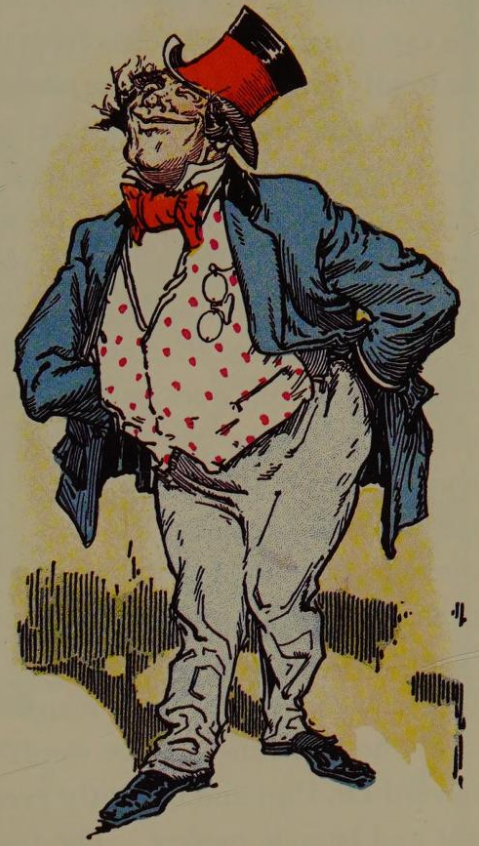It is all for naught. The Tin Woodman refuses to allow Ojo to tear a wing off a yellow butterfly and thereby attain the final ingredient. (The yellow butterflies all live in the yellow Winkie Country and hence are under the Tin Woodman’s protection.) Ojo and Scraps are shocked and outraged, much as they were when they learned Ozma forbade the picking of six-leaved clovers. “I want to help Ojo, who is my friend,” declares Scraps, “to rescue the uncle whom he loves, and I’d kill a dozen useless butterflies to enable him to do that” (327). When the crying child (!) tells him that without killing a single butterfly he cannot save his uncle, the Tin Woodman even says to the mourning orphan child (!), “firmly” no less, “Then he must remain a marble statue forever” (328). Yeah, that legendary compassion on display. Some heart. /s
I don’t necessarily object to the principle that hurting a living creature is always wrong, but the Tin Woodman apparently values a single insect over the lives of two humans. Where is that compassion when the Tin Woodman kills the Kalidahs or butchers a cat to save a mouse or kills forty wolves in The Wonderful Wizard of Oz? Or when he attacks a bunch of jackdaws in The Marvelous Land of Oz?
“I’m Ojo the Unlucky,” says Ojo, despairing (329). When he describes the various circumstances that prove he is unlucky, the Tin Woodman ripostes that they are all lucky. His final advice to Ojo is to be Ojo the Lucky instead, treating this as an internal psychological state rather than an external metaphysical one.
The Disturbing Anticlimax
Upon their return to the Emerald City comes a bizarre ending. Ozma informs Ojo that she has apprehended Dr. Pipt, destroyed all his magical equipment, and burned his spell book (332). Glinda, who now apparently is aware of people’s predetermined fates, knew all about his journey and that he would fail. Glinda herself does not turn up to resolve the story this time around, however, but has her minion, the Wizard, act in her stead. The final chapter, entitled “The Wonderful Wizard of Oz” in an ironic reflection of the original novel, has the Wizard wrap up the characters’ issues with genuine magic as I mentioned above.

The Wizard greets Ojo in a room with Dr. Pipt and the petrified Margolotte and Unc Nunkie. Next the Wizard magically straightens out the literally crooked Dr. Pipt, announces the Woozy can live in the Royal Menagerie, and says that Ozma respects Scraps enough that she may live wherever she pleases “and be nobody’s servant but her own” (338). Reciting a magic word he learned from Glinda restores Margolotte and Unc Nunkie to life. Ojo weeps from joy, embracing his uncle, and when the Tin Woodman reminds him he is in fact Ojo the Lucky, Ojo responds, “Yes; and it is true!” With this, the book ends except for, in my Books of Wonder edition, Peter Glassman’s afterword.
The whole journey was completely pointless, with the Wizard resolving every conflict completely independent from the main characters. This is another disappointing ending, in part because it makes little sense: why didn’t Glinda intervene immediately and spare everyone this trouble? The subversion is so complete, however, that it feels deliberate.
You might object that Dorothy’s journey in The Wonderful Wizard of Oz is similarly pointless despite my more positive judgment of that book. This misses that, although the Wizard is a fraud in the scene The Patchwork Girl ending parodies, the characters in The Wonderful Wizard genuinely achieve things. They radically change the Land of Oz, and when the Wizard gives the Scarecrow “brains,” the Tin Woodman a “heart,” and the Cowardly Lion “courage,” he is not actually giving them any character growth or attributes. Their actions have already demonstrated they possess these qualities. They have learned and grown. Rather than the end of their journey, this is also just another episode of it, with a third of the book and more adventures to go before Dorothy achieves her goal of returning to Kansas.
In contrast, does Ojo even learn anything? His issue, being unlucky, is not a personality trait, as the original novel’s wisdom, compassion, and courage are, but rather a metaphysical condition. It is a matter of fantasy goofiness instead of potential real-life relevance. Through their own actions, the Lion can display courage, the Tin Woodman can display love, etc., but Ojo cannot exactly display luckiness by acting a certain way. The lesson might be just to have a positive attitude, which isn’t bad advice.
What I have not mentioned about the ending is that the Wizard also happily announces he lobotomized the Glass Cat.
“The Glass Cat, which Dr. Pipt lawlessly made,” continued the Wizard, “is a pretty cat, but its pink brains made it so conceited that it was a disagreeable companion to everyone. So the other day I took away the pink brains and replaced them with transparent ones, and now the Glass Cat is so modest and well behaved that Ozma has decided to keep her in the palace as a pet.”
“I thank you,” said the cat, in a soft voice (336–338).